Ten young people of Nepalganj have been left without citizenship after the chief district officer, despite a court directive, refused to implement the order to grant them citizenship. Take a look at how the District Administration Offices are helping produce stateless people.
Krishna Adhikari : Centre for Investigative Journalism-Nepal
On May 31, 2017, Sharanga Subedi and Bir Bahadur Dangi, judges on the Nepalganj bench of the Tulsipur High Court, ordered the District Administration Office (DAO) Banke to grant citizenship to Mohamand Sakil Halwai within one month and inform the court about it.
The High Court sent a letter detailing the ruling to the Banke DAO on June 18, 2017. Buoyed by the ruling, Sakil visited the DAO in Nepalganj. But instead of issuing a citizenship, the DAO told him that he lacked evidence of his father’s Nepali nationality.
Sakil’s lawyers lodged a petition at the High Court after the DAO’s refusal. On February 1, the High Court’s Nepalganj bench sent another letter to the DAO asking why citizenship certificates were not issued to Sakil and four others. The court had instructed the DAO to clarify within three days.
On February 4, the DAO, Banke replied to the High Court. In his response, Ramesh Kumar KC, the chief district officer (CDO), stated that under the Citizenship Act-2006 (Section 3, sub-section 2), there was no sufficient proof of his father’s nationality, which was cited as a reason for the rejection.
Bhuwan Giri, the registrar at the High Court, was stunned by the response from the CDO. Under Nepal’s Constitution, if a complainant is dissatisfied with a court ruling, the concerned party can appeal for a revision of the verdict. Otherwise, the ruling must be implemented. Contrary to the provision, the DAO, Banke instructed the court on why it couldn’t issue the citizenship.
According to the well-established principle of constitution and justice system, in case of any hurdle in implementing the court order, a way-out should be sought in consultation with higher authorities. If that doesn’t work, a meeting of Justice Coordination Committee should be called upon to find a way out. Giri, the acting registrar, said, “The DAO, Banke did nothing to resolve this. Instead, it sent a reply detailing why the ruling couldn’t be implemented. We are investigating whether this was to drag their feet on the matter.”
There are 10 other young people like Sakil who have been denied their rights to citizenship. When asked why the Banke district administration refused to implement the court order, it gave an unclear answer. First, KC, the CDO, said the court ruling failed to specify whether to grant citizenship by descent or by naturalization. “Unless the applicant’s father is a Nepali citizen, we cannot grant him or her citizenship by descent,” he said.
Nepal’s Constitution has clear provisions on citizenship for people like Sakil. According to Article 11 (5) of the Constitution: “A person who is born in Nepal from a woman who is a citizen of Nepal and has resided in Nepal and whose father is not traced shall be provided with the citizenship of Nepal by descent.” The young people of Nepalganj would have easily received their citizenship if this provision was followed by the authorities.
But the same Article of the Constitution has the following provision: “Provided that his or her father is held to be a foreign citizen, the citizenship of such person shall be converted into naturalized citizenship as provided for in the Federal law.”
The provision in the Constitution, however, is different from the DAO’s interpretation. If the applicant’s father turned out to be a foreigner, the citizenship will be converted into a naturalized one. That’s why the Constitution has used the term “converted into” in its language.
Young people such as Sakil, Shivani, Dikshya and Soni are eligible for Nepali citizenship, according to the country’s new Constitution. But the district administration, citing lack of Regulations and Act after the Constitution’s promulgation, has ignored the court directive and deprived them of citizenship.
Issue Citizenship: High Court
Shivani Singh/Dikshya Singh
Directive issued on December 7, 2016
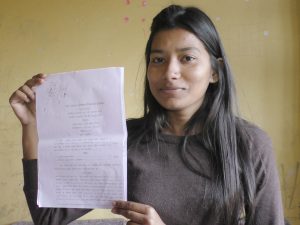
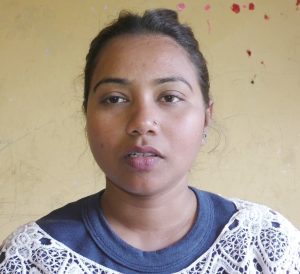 Shivani, 24, and Dikshya, 22, are sisters. They live in their home near Rani Talau at Nepalganj Sub-metropolitan City, Ward No 10. Both were born in Nepalganj. They did their school in the city.
Shivani, 24, and Dikshya, 22, are sisters. They live in their home near Rani Talau at Nepalganj Sub-metropolitan City, Ward No 10. Both were born in Nepalganj. They did their school in the city.
On November 28, 1984, Arati Singh, the girls’ mother, received the Nepali citizenship under the name of her father Anirudra Singh. Arati is a teacher at a government school in Nepalganj.
The girls’ father, Arun Singh, left for India in 1998 to work. Her family doesn’t know his whereabouts yet. Both of their parents are Nepali citizens; they were born in Nepalganj and grew up and went to school in the city. But they were denied citizenship because they couldn’t trace their father, said Shivani.
Lack of citizenship has casued Shivani and Dikshya immense anxiety. Nepal’s law requires every person at the age of 16 or above to have a citizenship for any official work. Citizenship is required to open a bank account, buy a SIM for mobile phone, to apply for a driving license, to enroll at college and to apply for job. “It has affected our study. My friends have already started their job after getting their citizenship, but for the last three years, I have been running from pillar to post to get my citizenship,” Shivani said. “We haven’t received the citizenship despite the court ruling, which was issued seven months ago.”
Deepika Soni
Directive issued on May 31, 2015
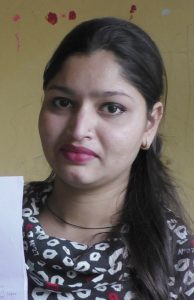 Deepika Soni, a 22-year-old resident of Nepalganj Sub-metropolitan City, was born in the city. She completed her school education here. She did a course on nursing from the Institute of Medical Technology in Bharatpur under a government scholarship programme. But she hasn’t acquired the licence from Nursing Council because she doesn’t have the citizenship. Without licence, she hasn’t been able to apply for jobs.
Deepika Soni, a 22-year-old resident of Nepalganj Sub-metropolitan City, was born in the city. She completed her school education here. She did a course on nursing from the Institute of Medical Technology in Bharatpur under a government scholarship programme. But she hasn’t acquired the licence from Nursing Council because she doesn’t have the citizenship. Without licence, she hasn’t been able to apply for jobs.
Her mother, Purnima Singh, has got citizenship by descent. Her father, Gajendra Singh, died on November 29, 1992. Her mother even receives an allowance given by the state to widows.
The DAO denied citizenship to Deepika on the ground that she was born before her mother’s marriage. On May 31, 2017, a joint bench of Sharanga Subedi and Bir Bahadur Dangi, issued a directive stating that a citizen’s birth date should be regarded as the time he or she became the country’s citizen and not the day he or she was granted the citizenship. Hence, Deepika was eligible for a citizenship under her mother’s name.
Arjun Khatik
Directive issued on June 17, 2015
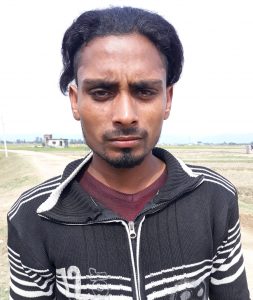 Nineteen-year-old Arjun Khatik was born in Ward number 24 of Nepalganj Sub-metropolitan City. His father, Madhav Ram Khatik, holds the Nepali citizenship by birth and his mother Mira Kumari Khatik has acquired citizenship by descent. Despite his parents holding Nepali citizenship, Arjun has been deprived of it.
Nineteen-year-old Arjun Khatik was born in Ward number 24 of Nepalganj Sub-metropolitan City. His father, Madhav Ram Khatik, holds the Nepali citizenship by birth and his mother Mira Kumari Khatik has acquired citizenship by descent. Despite his parents holding Nepali citizenship, Arjun has been deprived of it.
In 2007, under a special provision,the government issued citizenship by birth to people who could prove that they were born in Nepal, were living in the country and were 16 years old or older. The DAO, Banke had refused to grant him citizenship stating that he was born on May 29, 1998, before his father was granted the citizenship by birth. But Arjun is not the only one facing this problem. Hundreds of young people have become its victims. CDO KC said the cases in which the applicant’s birth date preceded the date when his or her father was granted citizenship had complicated the issue because there was no provision for such cases.
Sakil Halwai
Directive issued on May 31, 2015
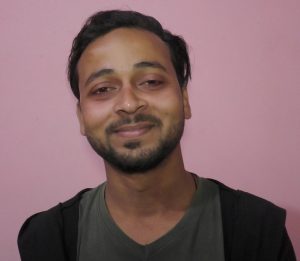 Sakil Halwai, 20, was born in Ward number 4 of Nepalganj Sub-metropolitan City. His mother Sabnam Halwai has acquired the citizenship by descent. He completed his school education in Nepalganj. On September 7, 2015, the Banke district court allowed his parents to separate following their differences.
Sakil Halwai, 20, was born in Ward number 4 of Nepalganj Sub-metropolitan City. His mother Sabnam Halwai has acquired the citizenship by descent. He completed his school education in Nepalganj. On September 7, 2015, the Banke district court allowed his parents to separate following their differences.
Now the DAO, Banke has required a document showing evidence of his father’s nationality. The court has already issued a directive to the DAO to grant him citizenship by descent. But Sakil has been denied citizenship because the court’s directive is yet to be implemented. “I am making do with the help of my mother’s bank account and mobile phone number. But I need my own citizenship to get a job and to apply for the driving licence,” he said. “I support my mother as the family’s breadwinner, but I am myself without citizenship.”
Aafrin Jarra Shesh
Verdict yet to come out
Nineteen-year-old Aafrin Jarra Shesh was born in Ward number 7 of Nepalganj Sub-metropolitan City. He has got school education. His father Rais Ahamad Shesh died on December 15, 2006 before getting the citizenship. His mother Rina Jarra Shesh had acquired the citizenship by descent on August 12, 1997 before her marriage. His grandfather Showkat Ali and uncle Saeed Ahmad had got their citizenship by birth on February 24, 2007. Now the DAO, Banke has asked him for a document showing the proof of his father’s nationality.
Ganesh Sunar
Directive issued on April 28, 2015
G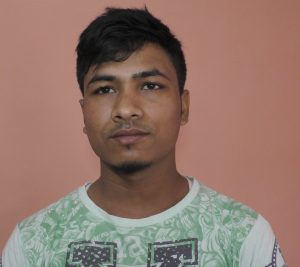 anesh Sunar, 19, was born in Khajura of Banke district. He completed his school education at his home village. His mother, Surya Sunar, acquired the citizenship by birth in 2007. His father, who had left for India to work, has been missing. They don’t have the man’s citizenship. The DAO, Banke has insisted that he produce a document showing his father’s nationality.
anesh Sunar, 19, was born in Khajura of Banke district. He completed his school education at his home village. His mother, Surya Sunar, acquired the citizenship by birth in 2007. His father, who had left for India to work, has been missing. They don’t have the man’s citizenship. The DAO, Banke has insisted that he produce a document showing his father’s nationality.
Sushma Gupta
Directive issued on November 8, 2017
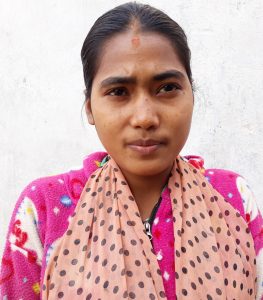 Twenty-one-year-old Sushma Gupta was born in Basudevpur, ward number 19 of Nepalganj Sub-metropolitan City. She went to a school in Nepalganj. Her mother, Nanda Kala Khadka, acquired citizenship by descent on September 22, 1985. Her father, Birendra Prasad Gupta, received the citizenship by birth on Febraury 12, 2007. She has also been denied citizenship because, according to the Banke administration, her birth date preceded the date her father got his citizenship document.
Twenty-one-year-old Sushma Gupta was born in Basudevpur, ward number 19 of Nepalganj Sub-metropolitan City. She went to a school in Nepalganj. Her mother, Nanda Kala Khadka, acquired citizenship by descent on September 22, 1985. Her father, Birendra Prasad Gupta, received the citizenship by birth on Febraury 12, 2007. She has also been denied citizenship because, according to the Banke administration, her birth date preceded the date her father got his citizenship document.
Sushma is angry because despite her parents holding the Nepali citizenship, she has been denied the national ID. She feels that it has hurt her self-confidence and self-respect. In a democracy, the right of a citizen is considered topmost. But Sushma couldn’t even open a bank account or buy a SIM card because she doesn’t have the citizenship.
Aishwarya and Samriddha Rai
Directive issued on June 14, 2017
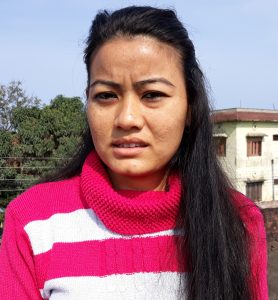
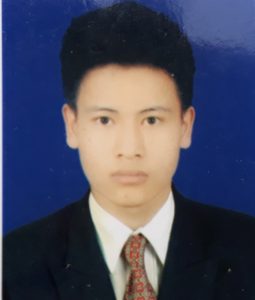 Aishwarya, 21, and Sambriddha Rai, 19, were born in Ward number 12 of Nepalganj Sub-metropolitan City. When their father, Rana Bahadur Rai, died on July 19, 1998, Aishwarya was one-year-old and her brother Sambriddha was in the womb. Their mother, Nirmala Rai, acquired citizenship by birth on February 22, 2007. Both have been denied citizenship by the administration, which has required them to produce a document showing their father’s nationality. The High Court has directed the DAO to grant them citizenship under their mother’s name, but the administration has repeatedly asked for a document to show whether their father was a Nepali or a foreigner.
Aishwarya, 21, and Sambriddha Rai, 19, were born in Ward number 12 of Nepalganj Sub-metropolitan City. When their father, Rana Bahadur Rai, died on July 19, 1998, Aishwarya was one-year-old and her brother Sambriddha was in the womb. Their mother, Nirmala Rai, acquired citizenship by birth on February 22, 2007. Both have been denied citizenship by the administration, which has required them to produce a document showing their father’s nationality. The High Court has directed the DAO to grant them citizenship under their mother’s name, but the administration has repeatedly asked for a document to show whether their father was a Nepali or a foreigner.
In 2007, the government deployed teams to distribute citizenship by birth to people living in Tarai districts. The team issued citizenship to around 8,000 people in Banke district. The government had amended the Citizenship Act (2006) through an ordinance. According the amended laws, the teams granted citizenship by descent to people who were born after their parents got citizenship by birth.
But on March 26, 2014, the ordinance became ineffective. On the day, the Ministry of Home Affairs sent a circular to its offices in all the 75 districts directing them not to follow the changes. That’s why people like Aishwarya and Sambriddhi found themselves in trouble.
Against the Constitution: Supreme Court
The Supreme Court has set a precedence according to which lack of identification of father should not prevent anyone from acquiring citizenship by descent under the mother’s name. Two years ago, the Supreme Court issued a directive to the government to grant citizenship by descent to two siblings who had been denied citizenship by Kathmandu’s DAO because their father couldn’t be identified. In their ruling, Supreme Court Chief Justice Kalyan Shrestha and Justice Om Prakash Mishra have stated that a person eligible for citizenship shouldn’t be denied the rights by creating obstacles.
“Despite the provision of granting citizenship under mother’s name for people who were given birth by a Nepali citizen, were born in Nepal and grew up in the country, to question whether their father is a Nepali or a foreigner to deny them citizenship is against the law,” the Supreme Court ruling reads. “It’s against the Constitution to not grant citizenship just because an applicant’s father hasn’t been identified.” The Supreme Court had issued the ruling on March 15, 2016.
Anita Sapkota acquired her citizenship in Kathmandu on May 3, 1984. She later got married to Shamim Siddique of Dumarbana village in Bara district. In 1987, she gave birth to a daughter, whom they named Sajda. Six years later, their son Asim was born. Three years later in December 1997, Shamim, who was travelling to his ancestral home, disappeared. He was never found.
In December 2007, Anita and her children applied for the recommendation for citizenship at a ward office of the Kathmandu Metropolitan City. When they tried to apply for citizenship at the Kathmandu District Administration Office, the CDO declined to register it. The DAO had refused to register the application citing flaws in the process. After the DAO refused to issue the citizenship under mother’s name, they challenged it at the court.
Responding to the writ petition, the Supreme Court said: “Despite the proof that the mother held citizenship by descent, the administration refused to grant citizenship citing that the father couldn’t be traced. The move seems to have been biased towards applicant Anita Sapkota because she is a woman. This has defied the constitutional provision.”



